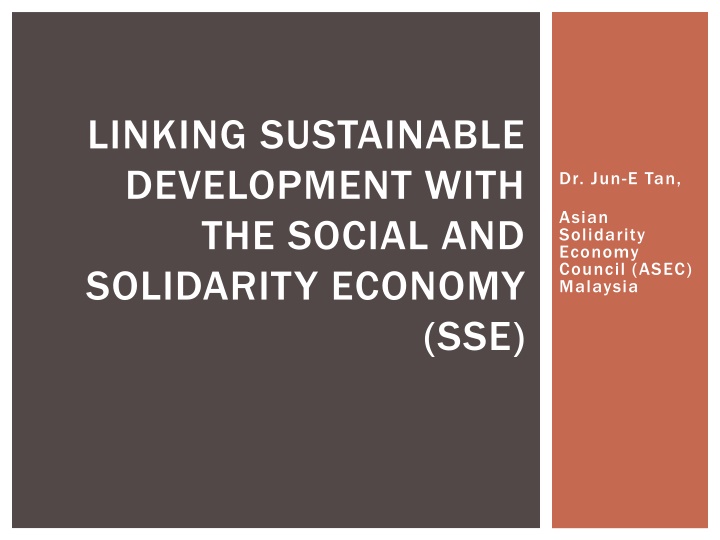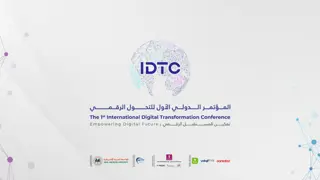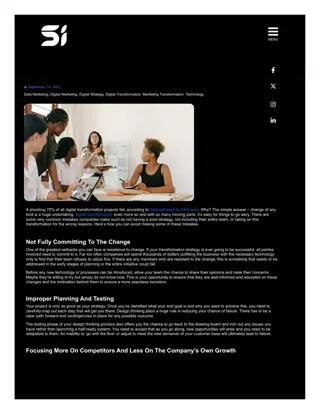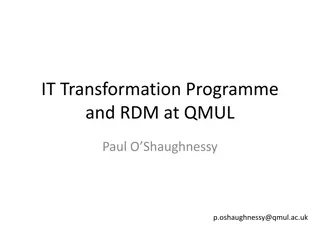Principles for Successful Organization-Wide Transformation Initiatives
This presentation by William (Bill) Judge explores essential principles for effective organization-wide transformation initiatives. Bill's experience, diagnostic tools, and simulation training tools contribute to successful change leadership. The presentation covers the importance of diagnosing organizational capacity for change, preparing a contextually-driven change plan, utilizing a wide array of change levers, adapting the plan to emerging realities, and maintaining credibility throughout the implementation process. Discover key insights and strategies for driving successful change in your organization.
Download Presentation

Please find below an Image/Link to download the presentation.
The content on the website is provided AS IS for your information and personal use only. It may not be sold, licensed, or shared on other websites without obtaining consent from the author.If you encounter any issues during the download, it is possible that the publisher has removed the file from their server.
You are allowed to download the files provided on this website for personal or commercial use, subject to the condition that they are used lawfully. All files are the property of their respective owners.
The content on the website is provided AS IS for your information and personal use only. It may not be sold, licensed, or shared on other websites without obtaining consent from the author.
E N D
Presentation Transcript
LINKING SUSTAINABLE DEVELOPMENT WITH THE SOCIAL AND SOLIDARITY ECONOMY Dr. Jun-E Tan, Asian Solidarity Economy Council (ASEC) Malaysia (SSE)
SUSTAINABLE DEVELOPMENT Economy Economy Is a tool to improve the well-being of Society Society within the limits of the Environment Environment Development that meets the needs of the present while safeguarding Earth s life support system, on which the welfare of future generations depends.
PATHWAYS TOWARDS SUSTAINABLE DEVELOPMENT Source: UNRISD (2012)
DEFINITION OF SSE the production of goods and services by a broad range of organisations and enterprises that have explicit social and often environmental objectives, and are guided by principles and practices of cooperation, solidarity, ethics and democratic self-management. The field of SSE includes cooperatives and other forms of social enterprise, self-help groups, community-based organisations, associations of informal economy workers, service-provisioning NGOs, solidarity finance schemes, amongst others. Production of goods and services Explicit social and often environmental objectives Principles of cooperation, solidarity, ethics, democratic self-management Types of SSE organisations (UN Task Force on SSE, 2014)
Social Economy Social Economy Part of the third system/sector Includes cooperatives, mutual societies, associations and foundations (CMAFs) and other types of social enterprises An important and supportive part of capitalism (to address social issues) Some see it as a stepping stone towards a fundamental transformation of the economic system
Solidarity Economy Solidarity Economy Different paradigm of development based on solidarity People and planet above profit Includes all three sectors Explicitly has a systemic, transformative, post- capitalist agenda
QUALIFIERS AND DISQUALIFIERS OF SSE ORGANISATIONS Qualifiers Qualifiers It has a primary social purpose, which is clearly stated as its core objective Disqualifiers Disqualifiers It is not a conventional business, which primary purpose is to maximise financial value for its owners It is not a conventional charity or non-profit organisation, which relies on grants and donations for its income It is not within the public sector (e.g. state-owned enterprises), or from a dependent project or initiative of a private corporation or other entity that is not in the social economy n/a Core purpose Core purpose Production of Production of goods and goods and services services It produces goods or services, and in doing so, earns a substantial proportion of its income Independence Independence and autonomy and autonomy It is independent and is part of the third sector Accountability Accountability It is accountable to its stakeholders with appropriate mechanisms to ensure accountability to members or beneficiaries, and to measure and report on whether and how its social objectives are being achieved Adapted from ILO, (2011, p.180)
LINK OF SSE WITH SUSTAINABLE DEVELOPMENT Historical position of addressing the overlaps and trade-offs in between social and economic pillars. Its proponents understand that inter-linking social and economic goals brings its strengths (when actors succeed in deriving both income and social benefits through well- designed processes) and also weaknesses (when difficult choices have to be made when social and economic bottom lines clash). Rootedness of SSE in real world practices presents it as a viable model of transformative change.















